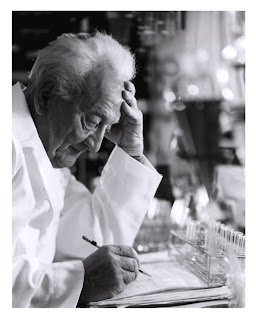AKA Albert Szent-Györgyi Imre
Date of birth: 16-September-1893
Place of birth: Budapest, Hungary
Died: 22-Oct-1986
Place of Death: Woods Hole, MA
Cause of death: renal failure
Sex: Male
Religion: Agnostic
Race or Ethnicity: White
Sexual orientation: Straight
Occupation: researcher, activist
Nationality: United States
Summary: vitamins C and B2
Military service: the Hungarian army (doctor, 1914-1916)
Albert Szent-Györgyi grandfather and uncle were both professors of anatomy at the University of Budapest. His uncle, Mihály Lenhossék, thought the young Szent-Györgyi was a bit dull, and tried to dissuade him from pursuing a career in science. He was allowed to work in his uncle Mihály laboratory, but when the teacher has suffered from hemorrhoids, he told his nephew in search of the human rectum. Szent-Györgyi first scientific paper related to the epithelium of the anus.
The First World War interrupted his studies and Szent-Gyorgyi was a doctor, Italian and Russian fronts, receives a silver medal for the wounded and discharged Valor first. Later, he admitted that his wound was self-inflicted - he had carefully chosen point in his left arm where a bullet would do no permanent damage, and shot himself to escape the war, saw only a huge waste of life.
Released from the army, he attended medical school and worked briefly in a bacteriology laboratory in Hungary, but quit after the experiences of the examination of Italian prisoners of war.
He wrote the article Potato respiratory mechanism of which is affected by Sir Frederick Hopkins, who has called Szent-Gyorgyi to join him in Cambridge. While working there he discovered vitamin C (ascorbic acid), the first isolation of nearly a gram of citrus fruits, some vegetables, and adrenal glands. His discovery was awarded the Nobel Prize in Physiology or Medicine in 1937. His research also showed that "hexuronic acid", as it was called, would prevent and combat scurvy, and Szent-Györgyi isolated Vitamin B2 or riboflavin after.
During the Second World War, was heavily involved in the Hungarian anti-fascist resistance, which seeks to help Jews leave the country. It 'became a fugitive Nazi authorities after Adolf Hitler ordered his arrest, but was hidden safely in Sweden. After the war he returned to Hungary to monitor the reconstruction of scientific institutions in Budapest.
When he realized that the new communist regime in Hungary did not permit free inquiry, Szent-Györgyi emigrated to America in 1947, where he studied the metabolism of muscle cells, and the application of quantum physics to biochemical studies of cancer. It 'became an American citizen in 1955, and founded both the Institute of Muscle Research and the National Foundation for Cancer Research. In 1960, he was an opponent of nuclear proliferation and the American war in Vietnam.
Father: Nicolas Szent-Györgyi (property manager)
Mother: Josefine von Szent-Györgyi Nagyrapol
Wife: Cornelia Demeny ("Nelly," Mr. 1917, the duration of the 1941st)
Szent-Györgyi's daughter Cornelia ("Little Nellie", b. 1918)
Wife: Martha Borbiro Miskolczy Szent-Györgyi (Mr. 1941, D. 1963 cancer)
Wife: Marcia Houston (Mr. 1975)
Medical School: MD, University of Budapest (1917)
Scholar: Pharmacology, Royal Hungarian Elizabeth University Bratislava (Bratislava) (1917-1919)
Scholar: Pharmacology and Biochemistry at the University of Berlin (1920)
Scholar: Pharmacology and Biochemistry, University of Hamburg (1921)
Scholar: Pharmacology and Biochemistry, University of Leiden (1922)
Scholar: University of Groningen (1922-1926)
Academic: University of Cambridge (1926-1930)
University: PhD, University of Cambridge (1927)
Administrator: University of Budapest (1945-1947)
Shot: Self (1916)
Nobel Prize for Medicine 1937
1954 Lasker Award
National Academy of Sciences 1956
Naturalized U.S. citizen 1955
Author of books:
Oxidation, fermentation, vitamins, health and disease (1939, research)
Muscle contraction (1947, R)
The nature of life (1947, R)
Muscle contraction and heart in the body (1953, research)
Bioenergetics (1957, R)
Introduction to submolecular biology (1960, research)
The mono loco (1970, research)
What now? (1971, from memory)
The receiving State, with observations on Cancer (1972)
 2:34 AM
2:34 AM
 Admin
Admin







0 comments:
Post a Comment